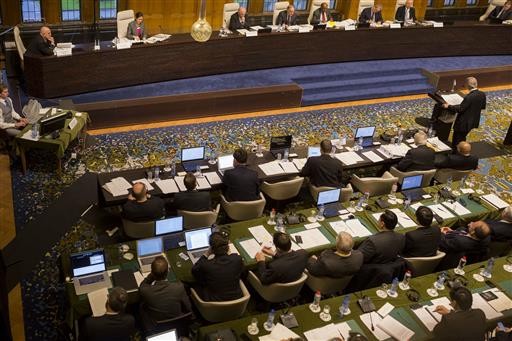Popular Reads
Top Results
Can't find what you're looking for?
View all search resultsPopular Reads
Top Results
Can't find what you're looking for?
View all search resultsSouth China Sea ruling deepens tensions between US, China
Change text size
Gift Premium Articles
to Anyone
A
landmark international tribunal ruling on the South China Sea threatens to sharpen the differences between from the United States and China, exposing a growing gulf between the world powers.
Daniel Kritenbrink, the White House policy director for Asia, said Monday's ruling in the case brought by the Philippines was "an important contribution to the shared goal of a peaceful resolution to disputes in the South China Sea." US officials expressed hope it could provide an impetus to diplomacy.
Unsurprisingly, China was less sanguine, as the ruling rejected the legal basis of China's expansive territorial claims.
Chinese ambassador to the US, Cui Tiankai, reiterated Beijing's support for negotiations among concerned parties to resolve territorial disputes, but he said the ruling would set back the prospects of diplomacy in the South China Sea, where in all, six Asian governments have competing claims.
"It will certainly intensify conflict and even confrontation. In the end it will undermine the authority and effectiveness of international law," Cui said, hours after the Hague-based tribunal issued its decision.
The two both spoke at Washington's Center for Strategic and International Studies think tank, and their comments reflected how the South China Sea is increasingly the spoiler in relations between the US and China.
President Barack Obama and Chinese President Xi Jinping have managed to cooperate on global issues such as climate change. But at the same time, tensions have grown over China's land reclamation in the South China Sea, where it has created artificial islands with military facilities, viewed by the US as an attempt to gain effective control of the area.
The US has responded with more military patrols, which China views as provocative.
If first reactions to the tribunal ruling are anything to go by, the differences are set to deepen — although both sides say they don't want this divisive issue to dominate the relationship.
Kritenbrink said the US stance was not driven by any strategic rivalry between the US and China, but a desire to uphold the "rules-based international order." He said if that broke down, and countries built up strength and became more assertive, history shows it could lead to "tragic outcomes."
Cui also warned of the risk of conflict, but said it was China that was standing up for international law, by rejecting legal arbitration it had not consented to.
The tribunal ruled it had jurisdiction in the case under the UN Convention on the Law of the Sea, which both China and the Philippines — but not the United States — are party to.
Amarjit Singh, a senior consultant at IHS Country Risk, predicted that after the ruling, the US would undertake so-called "freedom of navigation" patrols and flights within the area claimed by China to reinforce the arbitration's findings that various Chinese claims there are not valid.
US lawmakers are urging such action. Influential Republican Sen. John McCain was among those calling Monday for the US to regularly challenge "China's excessive maritime claims."
Since the tribunal ruled that some of China's artificial islands are so-called "low tide elevations" that are not entitled to 12 nautical miles of territorial sea, the US may be tempted to sail closer than it has in the past.
"In theory we could sail within 500 meters" of Mischief Reef, said Michael McDevitt, a retired US Navy rear admiral with long experience in the Pacific, referring to one of the reclaimed islands, about 130 miles (210 kilometers) off the Philippine coast.
Cui said such operations are a threat to freedom of navigation by commercial and civilian vessels.
He compared Obama's strategic "pivot" to boost the US presence in the relatively stable Asia-Pacific to American interventions in Middle East countries such as Iraq, Libya and Syria — implying that it could lead to turmoil.










